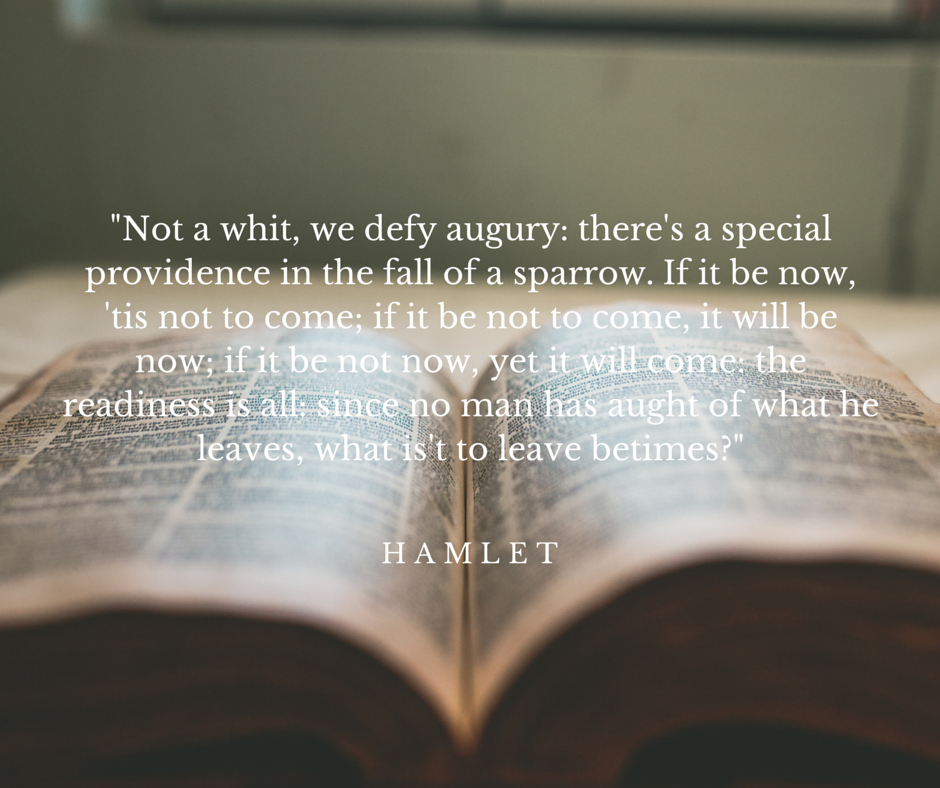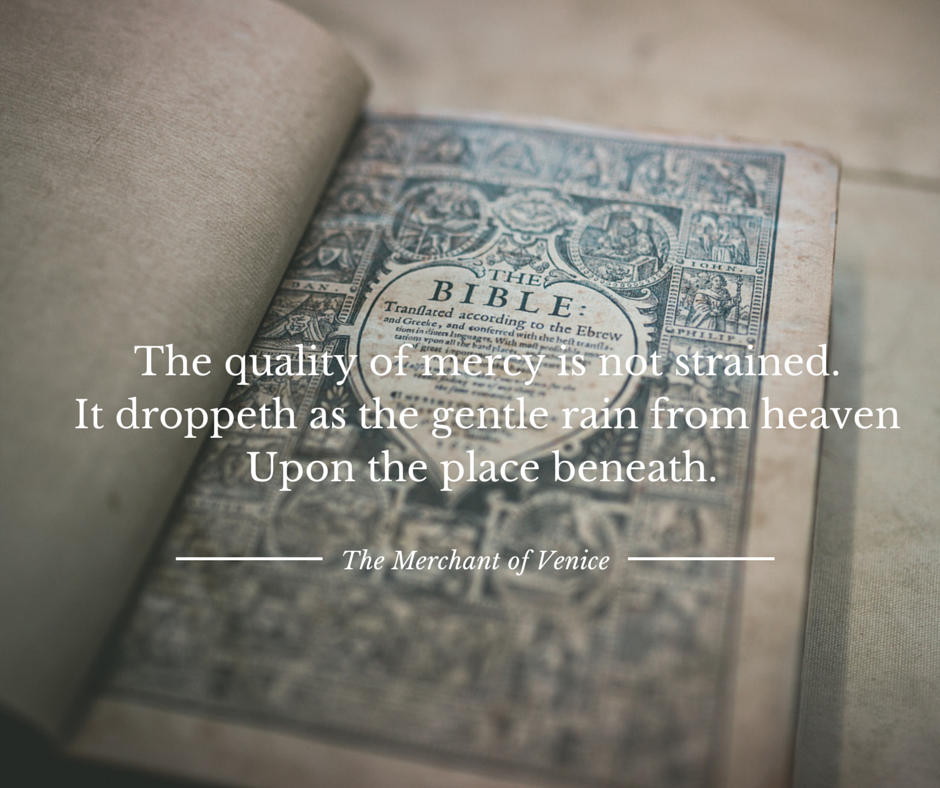‘Shall I keep your hogs and eat husks with them? What prodigal portion have I spent, that I should come to such penury?’
In Shakespeare’s play As You Like It,[2] he is alluding to Jesus’ parable of the ‘Prodigal Son’. The way Shakespeare uses this story reveals a great deal about his use of the Bible and something about the man himself.
Shakespeare does not use the Bible in a theological way, nor does he feel any obligation to make the story lines parallel. Shakespeare uses the Bible as his greatest and most-loved source of allusion, of the images which help him to portray situations of all kinds – tragedy, despair, pathos and even humour. In his church-attending age, Shakespeare knows that his audience is familiar with the Bible. As he writes, he is constantly aware that his biblical allusions will move them far more effectively than if he used unfamiliar sources.
In the scene from As You Like It, Orlando is angry with his elder brother, Oliver, for mistreating him and forcing him into poverty. Keeping pigs and eating husks were the last resort of the penniless prodigal son of Luke 15:15-16. And just in case his audience missed that, Shakespeare carefully puts the word ‘prodigal’ in Orlando’s mouth.
Shakespeare does not intend the audience to draw precise parallels between the actual story of the prodigal son and Orlando’s situation. Orlando did not demand his inheritance and squander it in a far-off country. Orlando is a victim here; ill-treated by his brother. Shakespeare knew that people would immediately recall the prodigal son story and understand vividly thereby that Orlando was in abject poverty.

From Hamlet, Act 5, Scene 2. Shakespeare paraphrases a biblical passage from Matthew 10, that no sparrow falls without God’s knowledge.
A Preference for the Geneva Bible
From Orlando’s words we also learn something about Shakespeare himself. A regular church attender, Shakespeare would have heard the gospels read from the Bishops’ Bible, a Bible produced under the authority of the Church of England in 1568 to counter the Calvinism of the preceding Geneva Bible. This Bible, and all other Bibles Shakespeare might have heard, say that the pigs were fed ‘pods’. The only Bible to have ‘husks’ was the Geneva Bible.
Shakespeare did not hear the word ‘husks’ in school as a child, nor in church. He read it in the Geneva Bible which was not a church Bible but a personal Bible which people owned, the private Bible of choice for Bible-reading Protestants
Shakespeare consciously uses biblical allusions well over a thousand times as well as numerous, less conscious uses of biblical words. His allusions cannot always be traced to a specific Bible version but when they can, they are often from the Geneva Bible which he clearly owned and read thoroughly. He uses not only its text, but even its headings, its marginal notes and its Preface.
Hearing the Bishops’ Bible in Church
A small number of Shakespeare’s allusions are traceable to the Bishops’ Bible, showing that some Bible passages were in Shakespeare’s memory from hearing the Bible read in church.
In Love’s Labour’s Lost, Biron declares that “Charity itself fulfils the law”.[3] “Charity” was a word peculiar to the Bishops’ Bible and the allusion is drawn from Romans 13:10, “Charitie woorketh no ill to his neyghbour, therefore the fulfilling of the lawe is charitie”. The Geneva Bible did not mention charity but used the word “love”. Shakespeare goes a step further, showing that he understood the competing translations when he cleverly has Longaville say, “Thy love is far from charity”. [4]

Does this quote from Shakespeare’s Merchant of Venice remind you of anything? What Bible reference is Shakespeare alluding to? Could it be Matthew 5:45, “He causes his sun to rise on the evil and the good, and sends rain on the righteous and the unrighteous”?
The Bible in the Prayer Book
The Bible itself was not Shakespeare’s only source of his biblical allusions. Shakespeare was very familiar with the Book of Common Prayer, the prayer book of his Church of England church. Shakespeare was obviously a regular and interested church attender with an affection for the words of the Prayer Book which is full of biblical phrases.
Shakespeare particularly loved the Psalms as they were found in the Psalter, the form in which they were used for public worship in church. Shakespeare quotes the Psalms more than any other book of the Bible except Matthew.
When the specific Bible version is detectable in his words or phrases, it is Miles Coverdale’s 1535 version. Coverdale had never claimed to be a good scholar and his version languished. But he had a way with words and no one has ever translated the Psalms more beautifully or poetically than he did. His Psalms have been preserved in the Psalter, the Psalms of Anglican worship. Even today, traditional Anglicans who use the Book of Common Prayer, sing Miles Coverdale’s Psalms.
In King Richard III, Richmond’s prayer for his troops contains the phrase, “Put in their hands thy bruising irons of wrath.” [5] This imagery comes from Psalm 2:9 in the Psalter, “Thou shalt bruise them with a rod of iron.” The Geneva Bible expresses this differently: “Thou shalt krush them with a scepter of yron.”
In several places, Shakespeare uses the word “span” for the length of life. “How brief the life of man…the stretching of a span.” [6] In Psalm 39:6, the Psalter has, “Thou has made my days as it were a span.” Both the Geneva and Bishops’ Bibles have the phrase “hand breadth” rather than “span”.
Shakespeare’s familiarity with the Chur
ch of England services made them another important source of imagery. He uses all parts of the Prayer Book: Morning and Evening Prayer, Communion, Baptism, Marriage and Burial Services. He quotes the creeds, the confession, the collects, the Litany and the Catechism. He even recalls the Homilies, the printed sermons which clergy were required to read.
Importantly, Book of Common Prayer imagery is mostly biblical imagery. About 80 per cent of its words and phrases are drawn from the Bible. So in using the Prayer Book, Shakespeare was mostly quoting the Bible.
The Bible in the Heart
Shakespeare’s total familiarity with Scripture and mastery of the Bible text is particularly evident when he draws simultaneously from more than one part of the Bible. In King Henry 8, the spurned Queen Catherine bewails her hopeless future: “Like the lily that once was mistress of the field, and flourished, I’ll hang my head and perish.”[7] Shakespeare here combines imagery from two widely separated parts of the Bible:
“Learne howe the lilies of the field do growe: they labour not neither spinne: Yet I say unto you that not even King Solomon in all his glory was araied like one of these.” (Matthew 6:28-29)
“The dayes of man are as grasse: as a flowre of the field, so flourisheth he. For the wind goeth over it, and it is gone.” (Psalm 103:15-16)
The combination of these two passages, one from a gospel and the other from a Psalm, cleverly creates a striking allusion which most of Shakespeare’s church-going audience would readily recognise and understand.
Queen Catherine sees herself as like the wild lily, once the flourishing mistress of the field, clothed in royal splendour like King Solomon. But her fate now is to perish, as the wildflowers do in the hot wind. People who have absorbed the words of the Bible do not need these allusions explained. They immediately hear the Bible in ‘lily of the field’, and ‘flourisheth’, words already in their hearts and minds.
An avid reader, Shakespeare used a variety of sources for his plots, often basing story lines on classical authors like Ovid and Plutarch, whom he would have studied in school, as well as contemporary sources. But for his allusions, for the figures of speech he puts in the mouths of his characters, he drew most heavily on the stories and language on the Bible, far more than on any other source.
This would have come naturally to Shakespeare. He clearly knew and valued the Bible. This important facet of Shakespeare’s plays is becoming less appreciated as time goes by.
In this post-Christian era, Bible words no longer reverberate in the hearts and minds of a public unfamiliar with the Bible. Modern concerns now dominate the academic analysis of Shakespeare’s plays. Modern writers want him to be an atheist or a political subversive, or to explore his sexual orientation – any possible speculation rather than simply understanding him as a practising Christian steeped in the words of the Bible.
Even beyond the words of Scripture, Shakespeare’s great themes are the great themes of the Bible: sin, hell, damnation, repentance, forgiveness and, most pervasive of all, redemption. Anyone who themselves knows and has internalised their Bible cannot help but read between the lines and glimpse a man who knew his Bible well, understood its message and took pleasure in employing its words in the speech of his characters.
[1] Hamlet, 5.1.35-36
[2] As You Like It, 1.1.37-49
[3] Love’s Labours Lost, 4.3.361-362
[4] Love’s Labours Lost. 4.3.125
[5] King Richard III, 5.3.110
[6] As You Like It, 3.2.129-131
[7] King Henry 8, 3.1.151-153
Email This Story
Why not send this to a friend?

